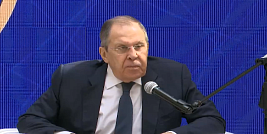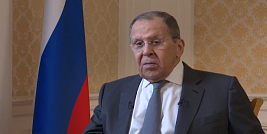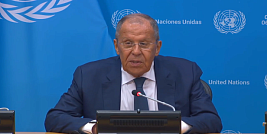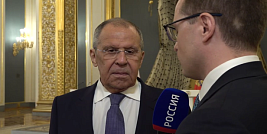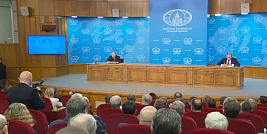Russian Foreign Minister Sergey Lavrov’s opening remarks and answers to media questions at a joint news conference following talks with Italy’s Minister of Foreign Affairs and International Cooperation Paolo Gentiloni, Moscow, June 1, 2015
Ladies and gentlemen,
This is Mr Gentiloni’s first visit to Russia as foreign minister. We have met before many times on the sidelines of various international forums. Mr Gentiloni also represented the Italian Republic during the celebrations of the 70th anniversary of Victory in WWII in Moscow.
Today, we stated that given the current tough situation in Europe, we need to practice a pragmatic and constructive approach. Just like us, our Italian colleagues are in favour of making joint efforts to improve the situation in Europe. I think this is the only approach that makes sense.
We have reviewed the state and prospects of bilateral cooperation, the schedule of upcoming contacts, including at the highest level. We have actively supported Italy’s efforts to focus on food security, which is the central theme of the current Universal Exposition EXPO-2015 in Milan. I was told that the Russian stand there is one of the largest and most visited.
We discussed relations between our departments as well. Things are looking up in this area. There were meetings between the ministers in charge of emergency situations, justice and culture. We are in favour of continuing this practice.
We agreed on conducting further regular consultations between our foreign ministries, including on fighting international terrorism, organised crime and drug trafficking as part of a bilateral working group to combat new challenges and threats that was established in 2013.
This morning, Mr Gentiloni met with Deputy Prime Minister ArkadyDvorkovich as co-chair of the bilateral Council for Economic, Industrial, Monetary and Financial Cooperation. They outlined plans for work in this area. Our Italian colleagues have confirmed that the St Petersburg International Economic Forum will most likely be attended by a representative delegation of Italian businessmen.
We were unanimous regarding the need to maintain and improve the atmosphere of trust, mutual understanding and enhancing cultural ties and contacts between our people, especially between young Italians and Russians. In this regard, much is being done by the Russian-Italian Civil Society Forum-Dialogue, which has effectively implemented many joint initiatives.
We have discussed international and regional issues. Of course, we focused particularly on the situation in Ukraine. We underscored that there is no alternative to the implementation, by the parties to the conflict, of all Minsk agreements of February 12. Of course, we once again discussed the attempts to distort, alter and interpret these agreements. We are convinced that the most important thing now is to focus on the central provision of the Minsk agreements, which is to establish direct dialogue between Kiev and Donetsk and Lugansk. Without this, it is impossible to resolve any problem.
It is imperative to bring speedy relief to the life of the people residing in the self-proclaimed republics, lift the economic blockade and resume the provision of social benefits. We are hopeful with regard to tomorrow’s meetings of the Contact Group’s working sub-groups in Minsk, the participants of which will consider concerted steps regarding further de-escalation of the military-political situation and stopping violations of the ceasefire agreement.
We reviewed relations between Russia, the EU and NATO. We have reiterated our position regarding the counterproductive confrontational policy pursued by Brussels. We have also noted the importance of starting practical work on agreeing upon the foundations to build European security on. Thesefoundations must be acceptable for all and security must be equal, indivisible and equal for all, without any dividing lines or differing security level zones. Of course, we are in favour of promoting debates on harmonising integration processes in Europe. You are aware of our initiatives aimed at starting a dialogue between the European Union and the Eurasian Economic Union in the context of our shared goal, which is to form a common economic and cultural space from the Atlantic to the Pacific.
We focused on the situation in the Middle East and North Africa, noting the need to intensify efforts to counter the threat of terrorism and extremism coming from that region. We focused particularly on the situation in Libya, including major migration challenges recently faced by the European countries, above all, Italy. We are willing to continue cooperation with our Italian colleagues and our other international partners on this issue, including within the UN.
Overall, we are satisfied with the outcome of the negotiations. I hope that we share this assessment.
Question: My question has to do with the so-called black list, which seems to have been drawn up as a response to Western sanctions a while ago, but was made public only recently. Why wasn't it published earlier? What criteria did the Russian side use as it drafted this list? It seems that it was specifically the criteria for choosing the names to be put on the list that raised so many questions. Since there’s a European black list, is there an American one as well?
Sergey Lavrov: It’s useful to discuss this issue, because it shows many aspects of our relations with our Western partners. The way I see it is that we are being accused of compiling a random list of persons who are denied entry to Russia, without any grounds, whereas the EU has compiled a good list, because every Russian on it deserves being denied entry to the EU.
I’m not even comfortable discussing the absurdity of this line of thinking. This is an attempt to substitute someone’s own political preferences for international law. Leaders and members of the Russian parliament are being chastised for the decisions they take as they vote “behind closed doors” on issues that are critical for Russia, including their attitude toward the results of the referendum in Crimea and Sevastopol. It’s unheard of in history for MPs to be punished in that way because of their political stance. Therefore, the sanctions that have been adopted by the EU and the United States and some of your other allies are absolutely illegitimate.
We didn’t want to make this whole thing public, but of course, we couldn’t violate the principle of reciprocity, which is a fundamental law of international relations. When the EU imposed restrictions on about 150 Russians, we responded appropriately, but for a much smaller number of EU citizens, because we didn’t want to follow the EU’s negative example, start a loud campaign and name all the names, as Brussels did. We just made our partners in the EU aware of the fact that Russia also has a sanction list, but we will not make it public or send it to Brussels, so as not to make a big deal out of it. We asked the European Commission to inform parliamentary, political and public officials from the EU planning to go to Russia to check with the Russian consulates in their respective countries to determine whether they can use their travel documents (diplomatic passports and visas) if they plan to go to Russia. That's all there is to it.
I’m not sure how well the European Commission complied with this request, but there were no complaints on its behalf regarding this arrangement, which have been in place for almost a year. Only after an incident with a Bundestag member did the European Commission suddenly recall that such an agreement existed and stated that it does remember that we notified them of it, but probably not everyone can use this opportunity. Why doesn’t Russia make this list available exclusively for their information, in confidence, so that Brussels could inform the people included in that list? At request of the European Union, we gave them this list on a confidential basis, and it was immediately leaked to the media. The European Union, which allegedly does not comment on leaks, happily did so on this occasion. Here, I also see certain violations of ethical standards.
Here’s the last point I want to make in connection with the allegations to the effect that the European Union had imposed sanctions based on some law, while Russia did so in a completely arbitrary manner. Please note this and tell your readers and listeners that we responded to a unilateral, unfriendly and unprovoked move. We did so after a long period of inactivity where we tried to refrain from taking retaliatory steps.
We didn’t respond when the European Union fully abandoned all the positions set out in the Agreement of February 21, 2014, that were endorsed by the foreign ministers of three major European countries, which involved the creation in Ukraine of a government of national unity representing the interests of all citizens of Ukraine, including Russians and Russian-speaking people. This agreement was trampled upon the very next morning. No one from the European Union, including the ministers who put their signatures to this agreement, uttered a word in its defence.
This opened the way to a coup, with ultranationalists playing the key role, including those who used and are still using Nazi rhetoric. When these people came to power by overthrowing a legitimate government and said that they are now the leaders of Ukraine and began to adopt laws directly attacking the Russian language, when the new leaders started saying that Russians must be expelled from Crimea, because Russians will never glorify Stepan Bandera, the European Union, too, was silent. We did not respond to such behaviour on the part of the European Union, which was a direct indication of its inability or unwillingness to raise their voice in defence of Russians in Ukraine.
The retaliatory sanctions concerned the actors who most actively supported the coup, which resulted in Russians residing in Ukraine being subjected to persecution and discrimination. This is being done despite numerous conventions, to which Ukraine is a signatory, which require protection of the rights of ethnic minorities and groups. Perhaps, precisely because Ukraine wants to legitimise such a policy, it recently officially renounced the use of such conventions in Donbass. Once again, we haven’t heard anything from the European Union this time. Please rest assured that, in responding proportionately, but to a lesser extent than the unilateral EU sanctions, we are not going to be the first to unwind this spiral. It all depends on our partners and their understanding of the situation and the ability not to hide the truth and not to pretend that they don’t understand what’s going on.
Question: Russia is a major partner which can play an important role in resolving the Libyan problem. At what stage are the UN talks on this subject? What does Russia think about the Security Council resolution on Chapter VII of the UN Charter?
Sergey Lavrov: My colleague Paolo Gentiloni already mentioned that we discussed this issue today. We are well aware of the difficulties experienced by Italy and other European countries caused by an influx of immigrants and the recent surge in illegal migration through Libya. Almost all migrants are not Libyans but citizens of other countries which were affected by “the echo, the thunder and awe” of the conflict that broke out in Libya and involved bombing and overthrowing the Gaddafi government. In order to topple the Libyan leader, certain countries, including in that region, supported the extremists, who soon formed terrorist groups, which are now trying to establish their rule already in a dozen other countries. People are fleeing their countries through Libya, because that country offers them a convenient route.
According to Mr Gentiloni, there’s a well-functioning criminal business to export illegal migrants in Libya. We are well aware of this. Please note that Russia is second only to the United States in terms of the number of immigrants: last year alone, we took in about a million Ukrainian refugees from Donbass. However, Russia is interested in international cooperation on legal regulation of refugee problems, primarily based on the need to comply with international humanitarian law and prevent the unscrupulous organisers of this criminal business from enslaving migrants and leaving them powerless, and without providing proper conditions for them.
With regard to specific discussions in the UN Security Council, they have been suspended because, as we were told, EU representatives are consulting with the legitimate Libyan government, which is recognised by the UN and resides in Tobruk, where there’s a Council of Deputies and a government headed by Abdullah al-Thani. A number of issues need to be clarified, because our colleagues from the European Union want to get a mandate for the operation that would be carried out not only in the open sea but also in Libya’s territorial waters, as well as on Libyan soil, including in the regions that are controlled not by the Tobruk-based authorities recognised by the United Nations, but the groups based in Tripoli.
Many specific issues arise in this regard. We have experience in combating piracy, which may provide certain answers regarding the legal grounds for detaining, inspecting, and arresting ships in the open sea but does not take into account all the subtleties, especially since immigrants will be involved. For example, what should be done with the captured ships? Some go as far as saying that they should be sunk. How does that relate to ownership rights? Which jurisdiction should be used to bring the organisers of this illegal business to justice? Most importantly, how should the rights be secured of the people who take the bait of a fast and safe, although expensive, trip to Europe, and are then left high and dry?
As my colleague Mr Gentiloni mentioned today, we will be expecting the EU to take decisions, because having Italy alone carry that weight is unlikely to be a fair proposition. We reaffirmed our commitment to assist in this matter, including through our activities in the Security Council.
You mentioned the resolution on Chapter VII of the UN Charter. If such a proposal is made, the operation's mandate will have to be written in minute detail, because we do not want a repeat of the ambiguity that gave rise to flagrant abuse of the resolution of the UN Security Council on Libya, adopted in 2011.
We hope that during the discussions in the UN Security Council, its members and the European Union as a whole will be able to take into account the statements and ideas that have recently been expressed by UN Secretary General Ban Ki-moon, UN High Commissioner for Human Rights ZeidRa’ad Al Hussein, UN High Commissioner for Refugees Antonio Guterres, and Director-General of the International Organisation for Migration William L. Swing on a number of initiatives aimed at improving the multilateral management of migration processes, especially in connection with the flow of illegal migrants through Libya. I think it is important to take into account the opinion of these multilateral institutions.
